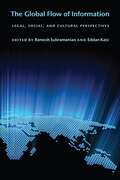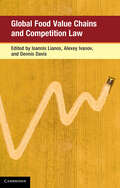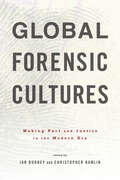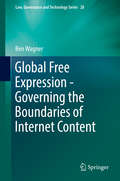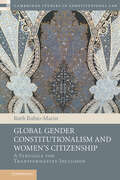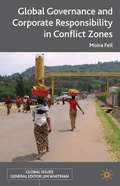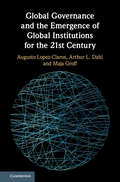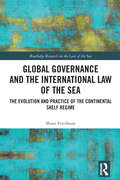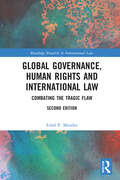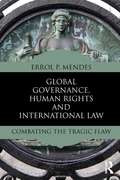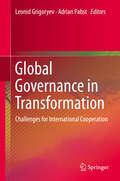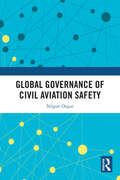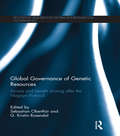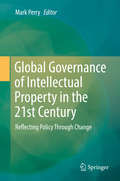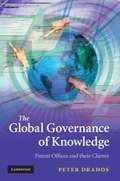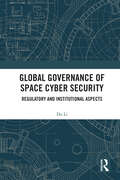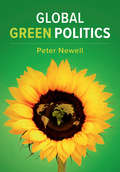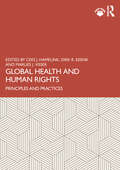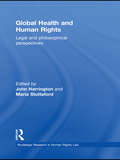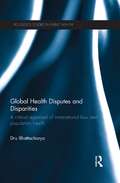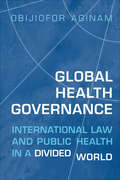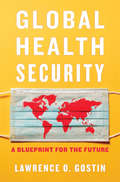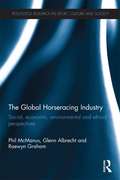- Table View
- List View
The Global Flow of Information: Legal, Social, and Cultural Perspectives (Ex Machina: Law, Technology, and Society #5)
by Ramesh Subramanian Eddan KartzThe Internet has been integral to the globalization of a range of goods and production, from intellectual property and scientific research to political discourse and cultural symbols. Yet the ease with which it allows information to flow at a global level presents enormous regulatory challenges. Understanding if, when, and how the law should regulate online, international flows of information requires a firm grasp of past, present, and future patterns of information flow, and their political, economic, social, and cultural consequences.In The Global Flow of Information, specialists from law, economics, public policy, international studies, and other disciplines probe the issues that lie at the intersection of globalization, law, and technology, and pay particular attention to the wider contextual question of Internet regulation in a globalized world. While individual essays examine everything from the pharmaceutical industry to television to “information warfare” against suspected enemies of the state, all contributors address the fundamental question of whether or not the flow of information across national borders can be controlled, and what role the law should play in regulating global information flows.Contributors: Frederick M. Abbott, C. Edwin Baker, Jack M. Balkin, Dan L. Burk, Miguel Angel Centeno, Dorothy E. Denning, James Der Derian, Daniel W. Drezner, Jeremy M. Kaplan, Eddan Katz, Stanley N. Katz, Lawrence Liang, Eli Noam, John G. Palfrey, Jr., Victoria Reyes, and Ramesh Subramanian
Global Food Value Chains and Competition Law (Global Competition Law and Economics Policy)
by Ioannis Lianos Alexey Ivanov Dennis DavisThe food industry is a notoriously complex economic sector that has not received the attention it deserves within legal scholarship. Production and distribution of food is complex because of its polycentric character (as it operates at the intersection of different public policies) and its dynamic evolution and transformation in the last few decades (from technological and governance perspectives). This volume introduces the global value chain approach as a useful way to analyse competition law and applies it to the operations of food chains and the challenges of their regulation. Together, the chapters not only provide a comprehensive mapping of a vast comparative field, but also shed light on the intricacies of the various policies and legal fields in operation. The book offers a conceptual and theoretical framework for competition authorities, companies and academics, and fills a massive gap in the competition policy literature dealing with global value chains and food.
Global Forensic Cultures: Making Fact and Justice in the Modern Era
by Ian Burney and Christopher HamlinEssays explore forensic science in global and historical context, opening a critical window onto contemporary debates about the universal validity of present-day genomic forensic practices.Contemporary forensic science has achieved unprecedented visibility as a compelling example of applied expertise. But the common public view—that we are living in an era of forensic deliverance, one exemplified by DNA typing—has masked the reality: that forensic science has always been unique, problematic, and contested. Global Forensic Cultures aims to rectify this problem by recognizing the universality of forensic questions and the variety of practices and institutions constructed to answer them.Groundbreaking essays written by leaders in the field address the complex and contentious histories of forensic techniques. Contributors also examine the co-evolution of these techniques with the professions creating and using them, with the systems of governance and jurisprudence in which they are used, and with the socioeconomic, political, racial, and gendered settings of that use. Exploring the profound effect of "location" (temporal and spatial) on the production and enactment of forms of forensic knowledge during the century before CSI became a household acronym, the book explores numerous related topics, including the notion of burden of proof, changing roles of experts and witnesses, the development and dissemination of forensic techniques and skills, the financial and practical constraints facing investigators, and cultures of forensics and of criminality within and against which forensic practitioners operate.Covering sites of modern and historic forensic innovation in the United States, Europe, and farther-flung imperial and global settings, these essays tell stories of blood, poison, corpses; tracking persons and attesting documents; truth-making, egregious racism, and sinister surveillance. Each chapter is a finely grained case study. Collectively, Global Forensic Cultures supplies a historical foundation for the critical appraisal of contemporary forensic institutions which has begun in the wake of DNA-based exonerations.Contributors: Bruno Bertherat, José Ramón Bertomeu Sánchez, Binyamin Blum, Ian Burney, Marcus B. Carrier, Simon A. Cole, Christopher Hamlin, Jeffrey Jentzen, Projit Bihari Mukharji, Quentin (Trais) Pearson, Mitra Sharafi, Gagan Preet Singh, Heather Wolffram
Global Free Expression - Governing the Boundaries of Internet Content
by Ben WagnerThis book examines the changes in the governance of human expression as a result of the development of the Internet. It tells the story of the emergence of a global regime that almost completely lacks institutions, and develops a concept of 'expression governance' that focusses on the governance practices of key actors in Europe and North America. The book illuminates the increased disciplinary capacity of the Internet infrastructure that has become apparent to the public following Edward Snowden's leaks in 2013, and provides a theoretical frame within which such changes can be understood. It argues that the Internet has developed a 'global default' of permissible speech that exists pervasively across the globe but beyond the control of any one actor. It then demonstrates why the emergence of such a 'global default' of speech is crucial to global conflict in the international relations of the Internet. The book concludes with an elaboration of the regulatory practices and theatrical performances that enable a global regime as well as the three key narratives that are embedded within it.
Global Gender Constitutionalism and Women's Citizenship: A Struggle for Transformative Inclusion (Cambridge Studies in Constitutional Law)
by Ruth Rubio-MarinConstitutions around the world have overwhelmingly been the creation of men, but this book asks how far constitutions have affirmed the equal citizenship status of women or failed to do so. Using a wealth of examples from around the world, Ruth Rubio-Marín considers constitutionalism from its inception to the present day and places current debates in their vital historical context. Rubio-Marín adopts an inclusive concept of gender and sexuality, and discusses the constitutional gender order as it has been shaped by debates such those around same-sex marriage and the rights of trans persons. Covering a wide range of themes, from reproductive rights to political gender quotas and violence against women, this book offers a comprehensive feminist account of constitutional law. Truly international in scope and ambitious in subject matter, this is an invaluable resource for students and scholars working on gender within multiple disciplines.
Global Governance and Corporate Responsibility in Conflict Zones
by Moira FeilCorporations in conflict zones and their provision of security are particularly relevant for understanding whether private actors are increasingly sources of governance contributions that regulate public goods. Feil highlights the discrepancies between political and theoretical expectations of corporate engagement and governance contributions.
Global Governance and the Emergence of Global Institutions for the 21st Century
by Augusto Lopez-Claros Arthur L. Dahl Maja GroffIs there any hope for those who despair at the state of the world and the powerlessness of governments to find a way forward? Global Governance and the Emergence of Global Institutions for the 21st Century provides ambitious but reasonable proposals to give our globalized world the institutions of international governance necessary to address effectively the catastrophic risks facing humanity that are beyond national control. The solution, the authors suggest, is to extend to the international level the same principles of sensible governance that exist in well-governed national systems: rule of law, legislation in the common interest, an executive branch to implement such legislation, and courts to enforce it. The best protection is unified collective action, based on shared values and respect for diversity, to implement widely accepted international principles to advance universal human prosperity and well-being. This title is also available as Open Access.
Global Governance and the International Law of the Sea: The Evolution and Practice of the Continental Shelf Regime (Routledge Research on the Law of the Sea)
by Shani FriedmanThis book conducts an examination of the international legal regime of the continental shelf through the lens of international relations (IR), with a primary focus on global governance theory.Presenting a new perspective within the field of IR and international law, the book offers new insights into the rules, principles, practices, and actors that establish and govern social interactions and the management of common affairs at the transnational level. The governance framework within the continental shelf can encompass a wider scope than legal laws alone, incorporating informal rules or potentially disregarding formal “black letter” rules that may not be effectively applied in practice. To exemplify how governance theory and other IR theories contribute to the analysis of the legal regime concerning the continental shelf, the book conducts an in-depth examination of three significant issues: (i) the demarcation and delimitation of the continental shelf, (ii) the rights and obligations of coastal States in the continental shelf, and (iii) procedural matters related to the continental shelf and international maritime adjudication.This book will be of interest to students and scholars in the field of the law of the sea, international law, global governance, and international relations.
Global Governance, Human Rights and International Law: Combating the Tragic Flaw (Routledge Research in International Law)
by Errol P. MendesThis book offers a stimulating introduction to the links between areas of global governance, human rights global economy and international law. By drawing on a range of diverse subject areas, it argues that the foundations of global governance, human rights and international law are undermined by a conflict or ‘tragic flaw’, where insistence on absolute conceptions of state sovereignty are pitted against universally accepted principles of justice and human rights resulting in destructive self-interest for both the state and the global community. Following the election of President Donald Trump , the second edition will explores how we are witnessing a critical battle to ensure that human rights, international law and the beneficial aspects of globalization will still be relevant and applied in some of the critical institutions of global governance and in the operations of the global private sector. The second edition will focus on how States, institutions and global civil society will have to ramp up the struggle to fight this ‘tragic flaw’ that is now even more evident with the actions of the US and other authoritarian states, like China and Russia in this second decade of the 21st Century.
Global Governance, Human Rights and International Law: Combating the Tragic Flaw (Routledge Research in International Law)
by Errol P. MendesThis book offers a stimulating introduction to the links between areas of global governance, human rights global economy and international law. By drawing on a range of diverse subject areas, Errol P. Mendes argues that the foundations of global governance, human rights and international law are undermined by a conflict or ‘tragic flaw’, where insistence on absolute conceptions of state sovereignty are pitted against universally accepted principles of justice and human rights resulting in destructive self-interest for both the state and the global community. The book explores how human rights and international law are applied in some of the critical institutions of global governance and in the operations of the global private sector, and how States, institutions and global civil society struggle to fight this ‘tragic flaw’. The book is brought up to date by considering developments in the role of the IMF, the World Bank, bilateral investment treaties; the likely failure of the Doha round of WTO negotiations; the legacy of the 2008 financial crisis; and the role of the International Criminal Court and the evolving Responsibility to Protect doctrine in international peace and security crises in the Middle East, Central and West Africa among other regions of the world. With its intensely interdisciplinary approach, this book motivates new thinking in the realm of global governance and international law, and promotes the development of new strategies for negotiating between conflicting leadership and organisational values within global institutions. The book will be of great interest and use to students and researchers of public international law, international relations and political science, business and human rights, global governance and international trade and economic law.
Global Governance in Transformation: Challenges for International Cooperation
by Leonid Grigoryev Adrian PabstThis book analyzes the state of global governance in the current geopolitical environment. It evaluates the main challenges and discusses potential opportunities for compromise in international cooperation. The book’s analysis is based on the universal criteria of global political stability and the UN framework of sustainable development. By examining various global problems, including global economic inequality, legal and political aspects of access to resources, international trade, and climate change, as well as the attendant global economic and political confrontations between key global actors, the book identifies a growing crisis and the pressing need to transform the current system of global governance. In turn, it discusses various instruments, measures and international regulation mechanisms that can foster international cooperation in order to overcome global problems. Addressing a broad range of topics, e.g. the international environmental regime, global financial problems, issues in connection with the energy transition, and the role of BRICS countries in global governance, the book will appeal to scholars in international relations, economics and law, as well as policy-makers in government offices and international organizations.
Global Governance of Civil Aviation Safety
by Nilgun OzgurThis book indicates the shortcomings of the current international legal system and customary international norms that govern international aviation law to comply with contemporary air transport market realities. As the air transport market develops globally, the safety regime of civil aviation should also be governed and applied globally. In this book, the author departs from current international legal norms to examine the emerging legal field of global administrative law. Through that lens, the possibility of reconstructing the set of legal mechanisms that govern domestic and international administrative interaction in the global field of aviation safety is explored. This book demonstrates that a legal system is never complete but always develops in tandem with changing needs, i.e. the participation of the affected parties. Exploring the principles of GAL theory contributes to addressing the contemporary legal issues relating to state compliance with international aviation safety standards that would otherwise not be covered by customary international law. In particular, the principles of GAL theory regarding global governance and the ‘public’ character of global regulations, the role of individuals and states in global governance, and state sovereignty are considered valuable contributions to contemporary global aviation safety issues in practice. It is asserted in this book that proper checks and balances in global aviation safety can be improved by making these accessible to individuals by way of national courts. Finally, establishing public awareness of global aviation safety standards will eventually create greater pressure on states to implement and enforce them. This book is in an area increasing academic and research interest of practitioners of public international aviation law, global administrative law, global governance, and global aviation safety, global air transport market regulations.
Global Governance of Genetic Resources: Access and Benefit Sharing after the Nagoya Protocol (Routledge Research in Global Environmental Governance)
by Sebastian Oberthür G. Kristin RosendalThis book analyses the status and prospects of the global governance of Access Benefit Sharing (ABS) in the aftermath of 2010’s Nagoya Protocol to the Convention on Biological Diversity (CBD). The CBD’s initial 1992 framework of global ABS governance established the objective of sharing the benefits arising from the use of genetic resources fairly between countries and communities. Since then, ABS has been a contested issue in international politics – not least due to the failure of effective implementation of the original CBD framework. The Nagoya Protocol therefore aims to improve and enhance this framework. Compared to the slow rate of progress on climate change, it has been considered a major achievement of global environmental governance, but it has also been coined a ‘masterpiece of ambiguity’. This book analyses the role of a variety of actors in the emergence of the Nagoya Protocol and provides an up-to-date assessment of the core features of the architecture of global ABS governance. This book offers a central resource regarding ABS governance for those working on and interested in global environmental governance. This is achieved by focusing on two broad themes of the wider research agenda on global environmental governance, namely architecture and agency. Furthermore, individual chapter contributions relate and link ABS governance to other prominent debates in the field, such as institutional complexes, compliance, market-based approaches, EU leadership, the role of small states, the role of non-state actors and more. Partly due to its seeming technical complexity, ABS governance has so far not been at the centre of attention of scholars and practitioners of global environmental governance. In this book, care is taken to provide an accessible account of key functional features of the governance system which enables non-specialists to gain a grasp on the main issues involved, allowing the issue of ABS governance to move centre-stage and be more fully recognised in discussions on global environmental governance.
Global Governance of Intellectual Property in the 21st Century
by Mark PerryThis book analyses the governance foundations of innovation, brands, inventions, secrets and expression, which are the keys to a century based on knowledge. They are reflected in legal rights that have been fermenting over centuries of national policy deliberations on intellectual property rights, constantly in flux in the face of new advances in science, but overall a trend towards greater protectionism. As countries are challenged by the strictures of international agreements, often extorted through imbalanced power relationships, they seek their own national means for beneficial differentiation from the new global norms, whilst complying with international obligations. This book deals with the outcomes of regional governance of intellectual property, which often creates ripples in the search for harmony in the laws that form the basis for the future of intellectual property. The work has contributions that come from developing and developed nations, showing a common theme of the struggle to find the balance in an area of law that often does not provide clearcut solutions to real world environments. There are many intellectual property struggles illustrated in this work: patent at the boundaries of nature and invention, the need for drug development, which is driven by profit based on the patent monopoly; copyright, the expression of original thought, seeking to maximise exposure facilitated by the internet, but a system that facilitates rampant copying; trade marks, supporting company branding, seeks to exploit global branding through naming domains names; and other areas concomitant to the globalisation of intellectual property governance, such as foreign direct investment. This book holds up a mirror to the issues of world governance of intellectual property rights in this century, asking whether the direction we are currently following is in the best interest of global citizens, and showing the divergence that constraints are stimulating on a national level.
The Global Governance of Knowledge
by Peter DrahosPatent offices around the world have granted millions of patents to multinational companies. Patent offices are rarely studied and yet they are crucial agents in the global knowledge economy. Based on a study of forty-five rich and poor countries that takes in the world's largest and smallest offices, Peter Drahos argues that patent offices have become part of a globally integrated private governance network, which serves the interests of multinational companies, and that the Trilateral Offices of Europe, the USA and Japan make developing country patent offices part of the network through the strategic fostering of technocratic trust. By analysing the obligations of patent offices under the patent social contract and drawing on a theory of nodal governance, the author proposes innovative approaches to patent office administration that would allow developed and developing countries to recapture the public spirit of the patent social contract.
Global Governance of Space Cyber Security: Regulatory and Institutional Aspects
by Du LiThe book explores the regulatory and institutional aspects of global governance of space cybersecurity.Focusing on the regulatory aspects, this book argues that the current international law cannot handle the threats posed by malicious cyber and space activities, as regulatory gaps exist owing to terminological ambiguities and legal loopholes. A law-making process in the space field is proposed with a focus on developing soft law instruments through multistakeholder platforms. To enhance the implementation and enforcement of laws concerning space cybersecurity, it is crucial to emphasise the roles of international organisations and industries. Furthermore, empowering existing international institutions with supervisory powers and promoting national legislation and domestic judicial systems are feasible approaches to enhance compliance with the law.The book will attract international law scholars, especially those studying space law and cyber law.
Global Green Politics
by Peter NewellIn light of growing urgency in tackling the global environmental crisis, there is a need for new visions and strategies to ensure a more sustainable and just world. This book provides a comprehensive overview of Green perspectives on a range of global issues, including security, the economy, the state, global governance, development and the environment. Drawing on academic literature on Green political theory, combined with insights from real-world practice and the author's own extensive personal experience, it provides a timely and accessible account of why we need to embrace Green politics in order to tackle the multiple crises facing the world today. Presenting alternative visions and concrete strategies for achieving change, this book will be of interest to activists and policy-makers as well as students of environment, development and politics.
The Global Guide to Animal Protection
by Andrew Linzey Archbishop Desmond TutuRaising awareness of human indifference and cruelty toward animals, The Global Guide to Animal Protection includes more than 180 introductory articles that survey the extent of worldwide human exploitation of animals from a variety of perspectives. In addition to entries on often disturbing examples of human cruelty toward animals, the book provides inspiring accounts of attempts by courageous individuals--including Jane Goodall, Shirley McGreal, Birute Mary Galdikas, Richard D. Ryder, and Roger Fouts--to challenge and change exploitative practices. As concern for animals and their welfare grows, this volume will be an indispensable aid to general readers, activists, scholars, and students interested in developing a keener awareness of cruelty to animals and considering avenues for reform. Also included is a special foreword by Archbishop Desmond Tutu, urging readers to seek justice and protection for all creatures, humans and animals alike.
Global Health and Human Rights: Principles and Practices
by Cees J. Hamelink Dirk R. Essink Marlies J. VisserThis textbook explores public health and individual health care through the prism of global human rights and ethical decision-making.Written by leading experts in this field, the book is divided into three distinctive parts. Part I introduces the theoretical framework through which the core issues can be understood, contrasting a clinical approach to health care with a social determinant perspective and discussing the decolonialisation of global health. Part II discusses how a human rights rationale impacts different social groups, from children to the elderly to those with disabilities, highlighting issues such as abortion and euthanasia. Part III addresses contemporary topics such as infectious diseases, migration, mental health care, the impact of advanced medical technology and climate change. Each chapter features case studies which ask readers to assess complex ethical dilemmas, fostering decision-making based on clear moral reasoning, as well as discussion assignments and further reading.Also featuring online video lectures, this is an important textbook that will be essential reading for students across the health sciences, including medicine and all related fields.
Global Health and Human Rights: Legal and Philosophical Perspectives (Routledge Research in Human Rights Law)
by John HarringtonThe right to health, having been previously neglected is now being deployed more and more often in litigation, activism and policy-making across the world. International bodies such as the WHO, UNAIDS, World Bank and WTO are increasingly using or being evaluated with reference to health rights, and international NGOs frequently use the language of rights in campaigning and in more concrete litigation. This book brings together an impressive array of internationally renowned scholars in the areas of law, philosophy and health policy to critically interrogate the development of rights based approaches to health. The volume integrates discussion of the right to health at a theoretical level in law and ethics, with the difficult substantive issues where the right is relevant, and with emerging systems of global health governance. The contributions to this volume will add to our theoretical and practical understanding of rights based approaches to health.
Global Health Disputes and Disparities: A Critical Appraisal of International Law and Population Health
by Dru BhattacharyaGlobal Health Disputes and Disparities explores inequalities in health around the world, looking particularly at the opportunity for, and limitations of, international law to promote population health by examining its intersection with human rights, trade, and epidemiology, and the controversial issues of legal process, religion, access to care, and the social context of illness. Using a theoretical framework rooted in international law, this volume draws on a wide range of rich empirical data to assess the challenges facing the field, including international legal treaty interpretation, and specific issues related to the application of law in resolving pressing issues in gender, access to care, and social determinants of health. In doing so, it illustrates the challenges for implementing rights-based approaches to address health disparities, with profound implications for future regulations and policymaking. It includes both interviews with leading scholars, as well as a variety of case studies from prominent international forums, including formal claims brought before the Human Rights Council and the Committee on the Elimination of All Forms of Discrimination Against Women, as well as regional and national experiences, drawn from disputes in India, Indonesia, South Africa and the USA. This volume is an innovative contribution to the burgeoning fields of global health and human rights, and will be of interest to students and researchers in public health, global health, law and sociology interested in the social determinants of health and social justice from both theoretical and practical perspectives.
Global Health Governance: International Law and Public Health in a Divided World
by Obijiofor AginamGlobalization has immersed all of humanity in a single germ pool. There are no health sanctuaries in a globalizing world. In Global Health Governance, Obijiofor Aginam explores the relevance of international law in contemporary public health diplomacy. He focuses on the concept of mutual vulnerability to explore the globalization of disease, in what is paradoxically a global village and a divided world. Drawing from a wide range of disciplines, Global Health Governance offers a holistic approach to global health governance involving a multiplicity of actors: nation-states, international organizations, civil society organizations, and private actors. Aginam articulates modest proposals under the rubric of communitarian globalism, a paradigm that strives to meet the ideals of 'law of humanity.' These proposals project a humane global health order where all of humanity is inexorably tied into a global compact and where the health of one nation-state rises and falls with the health of others. International law—with its bold claims to universal protection of human rights and human dignity—is an indispensable governance tool for the reconstruction of damaged public health trust in the relations of nations and peoples.
Global Health Law
by Lawrence O. GostinThe international community has made great progress in improving global health. But staggering health inequalities between rich and poor still remain, raising fundamental questions of social justice. In a book that systematically defines the burgeoning field of global health law, Lawrence Gostin drives home the need for effective global governance for health and offers a blueprint for reform, based on the principle that the opportunity to live a healthy life is a basic human right. Gostin shows how critical it is for institutions and international agreements to focus not only on illness but also on the essential conditions that enable people to stay healthy throughout their lifespan: nutrition, clean water, mosquito control, and tobacco reduction. Policies that shape agriculture, trade, and the environment have long-term impacts on health, and Gostin proposes major reforms of global health institutions and governments to ensure better coordination, more transparency, and accountability. He illustrates the power of global health law with case studies on AIDS, influenza, tobacco, and health worker migration. Today's pressing health needs worldwide are a problem not only for the medical profession but also for all concerned citizens. Designed with the beginning student, advanced researcher, and informed public in mind, Global Health Law" will be a foundational resource for teaching, advocacy, and public discourse in global health.
Global Health Security: A Blueprint for the Future
by Lawrence O. GostinWith lessons learned from COVID-19, a world-leading expert on pandemic preparedness proposes a pragmatic plan urgently needed for the future of global health security. The COVID-19 pandemic revealed how unprepared the world was for such an event, as even the most sophisticated public health systems failed to cope. We must have far more investment and preparation, along with better detection, warning, and coordination within and across national boundaries. In an age of global pandemics, no country can achieve public health on its own. Health security planning is paramount. Lawrence O. Gostin has spent three decades designing resilient health systems and governance that take account of our interconnected world, as a close advisor to the Centers for Disease Control and Prevention (CDC), the World Health Organization (WHO), and many public health agencies globally. Global Health Security addresses the borderless dangers societies now face, including infectious diseases and bioterrorism, and examines the political, environmental, and socioeconomic factors exacerbating these threats. Weak governance, ineffective health systems, and lack of preparedness are key sources of risk, and all of them came to the fore during the COVID-19 crisis, even—sometimes especially—in wealthy countries like the United States. But the solution is not just to improve national health policy, which can only react after the threat is realized at home. Gostin further proposes robust international institutions, tools for effective cross-border risk communication and action, and research programs targeting the global dimension of public health. Creating these systems will require not only sustained financial investment but also shared values of cooperation, collective responsibility, and equity. Gostin has witnessed the triumph of these values in national and international forums and has a clear plan to tackle the challenges ahead. Global Health Security therefore offers pragmatic solutions that address the failures of the recent past, while looking toward what we know is coming. Nothing could be more important to the future health of nations.
The Global Horseracing Industry: Social, Economic, Environmental and Ethical Perspectives (Routledge Research in Sport, Culture and Society)
by Phil McManus Glenn Albrecht Raewyn GrahamHorseracing, thoroughbred breeding and gambling on racing are global industries worth several hundred billion dollars. They are also industries facing serious challenges, from the rise of alternative forms of leisure gambling to concerns about the ethical treatment of animals in all equestrian sports. This book offers a broad-ranging examination of the contemporary horseracing industry, from geographical, economic, social, ethical and environmental perspectives. The book draws on in-depth, mixed-method research into the racing and breeding industries in the US, Australia, the UK, Canada and New Zealand, and includes comparative material on other key racing centres, such as Ireland, Singapore and Hong Kong. It explores the economic structure of the global racing business, including comparisons with other major international sport businesses and other equestrian sports. It examines the social and cultural roots of the sport through its association with, and impact on, rural places, communities and environments from Kentucky to Newmarket – highlighting racing’s particular blend of tradition and scientific and technological innovation. The book also explores the ethical issues at the heart of horseracing, from reproduction to the use of the whip, and the inescapable tension between the horse as an instrumentally valuable commodity and the horse as an intrinsically valuable animal with needs and interests. The Global Horseracing Industry concludes by considering alternative futures for this major international sports business. The book is illuminating reading for anybody with an interest in sport, business, cultural geography, animal studies, or environmental studies.
